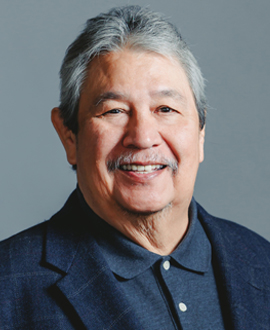Over a career spanning close to 50 years, Ricardo has distinguished himself as a visionary community leader, advocate, educator/mentor, behavioral and social science practitioner, and cultural scholar. His pioneering work in identifying and addressing the critical role of historical trauma and acculturative stress as primary barriers to the prosperity of Mexican Americans has improved health and social service approaches among providers throughout Arizona and around the nation.
Ricardo grew up in San Antonio, Texas, in a time when structural racism was the norm. As a young boy in the barrio, he felt the daily pain of discrimination and the constant fear associated with it. Working the farm fields over the summer, he saw the social injustice of hardworking Latino men and women enduring long hours, low wages, and poor living conditions. But he did not sit idly by. His activism sparked early when he joined a student walkout in high school demanding the right to speak Spanish without consequence and the addition of bilingual education. Ricardo was captivated by the Chicano movement in college and greatly inspired by Cesar Chavez and the Farm Workers’ March. After military service in Germany in the 8th Infinitary division, he returned to Texas where he was an active member of the Texas Raza Unida Party and the Texas Farm Workers movements. These efforts directly led to the creation of state-wide college Mexican American Studies programs and Chicano Cultural Centers (Centro Cultural Aztlan).
With an undergraduate degree in Psychology and experience as a chemical dependency counselor serving Latino/as in crisis, he sought to better understand how to identify and address intergenerational stress from historical trauma experienced by Mexican American individuals and groups. He wanted to find ways – through education and community-driven services - to address the internalization of negative perceptions and stereotypes by Mexican Americans that led to self-hate and alienation, lowered self-esteem, and overall ethnic identity conflict.
He focused his Master’s degree thesis on the development of a cultural assessment model featuring an Acculturation Rating Scale that would scientifically measure self-perception of Latino cultural identity, which was emerging in research as a key underlying factor in physical and emotional health. This 20-question scale, published with co-author Israel Cuellar in 1980, was the first of its kind in the field, and was a lynchpin in unlocking first-person insight into the role that acculturation plays in the life of a Mexican American. For the next 30 years, Latino scholars would build on this instrument to measure acculturation and illustrate cultural self-awareness.
In that same time period, the Chicano Movement progressed substantially in San Antonio with the local adoption of the Segundo de Febrero Chicano “holiday” in 1977 commemorating the signing of the Treaty of Guadalupe Hidalgo that ended the Mexican American War of 1846-1848 (the invasion of North America into Mexico) and established US-Mexico boundaries. Twenty years later, he would establish and lead annual celebrations of the Segundo holiday in the Tucson community and develop the Segundo de Febrero digital archive at Our Lady of the Lake University offering an expanding virtual library that chronicles 500 years of Chicano history. Recognizing the role that displaying a physical document like the 1848 Treaty would have in honoring the past and moving forward in positive reflection of cultural identity, he led efforts in 2010 to bring the document - housed at the National Archives in Washington DC - to Tucson, AZ. The original Treaty had never been seen in Arizona, and this exhibition drew record-setting attendance from US and Mexican citizens.
Throughout his career, Ricardo has never lost his focus on serving and advocating for the Chicano community. After positions in San Antonio with the Mexican American Unity Council and health care activist agency Chicano Health Policy Development, his concern for the skyrocketing drug problems affecting Mexican Americans led him to form the non-profit Chicano Alliance Against Drug Abuse and subsequently non-profit Nosotros, Inc., using funds from the City of San Antonio. These organizations provided pioneering Latino-focused prevention programming and led advocacy efforts resulting in inhalant legislation that restricted and closely monitored sales of common household inhalant products and channeled some of the revenue from inhalant product sales into substance use prevention efforts. He moved in the 1990s, administering highly impactful programs and raising over $23 million in grant dollars for non-profits Pinal Hispanic Council and Luz Social Services.
He founded non-profit Amistades, Inc. in 2006 as an agency by, for, and about Latinos that would bring best practice concepts in cultural responsiveness to enhance social service delivery across the lifespan. This agency’s impact has been demonstrable. In the past 16 years, its raised over $20 million in grants, allowing for authentic and genuine cultural programming designed to fit the needs of emerging issues for the Latino community in Southern Arizona.
In response to community need, he is now directing his agency’s efforts toward statewide systems-level change to negate common, false narratives promoted across media and entertainment, education, historic, civic, and cultural organizations, and even public parklands by putting forth messages accurately reflecting Latino community realties and perspectives. He is also positioning Amistades as regional convener, creating community networks promoting race equity, cultural community norms, and improvement of law enforcement community relations.
His achievements have been recognized at the highest level. Since being awarded Public Citizen of the Year by the National Association of Social Workers, Texas Chapter in 1982, he has gone on to receive numerous certificates of recognition and appreciation for his work with Mexican Americans, including a Certificate of Special Congressional Recognition from US Congressman Raul Grijalva. In 2018, The White House honored Ricardo and Amistades as one of its Bright Spots in Excellence for Hispanic Education for its holistic perspective in supporting Latino families.
The powerful and positive impact of Ricardo’s work has paved the way for the generations that will carry it forward.

